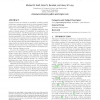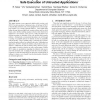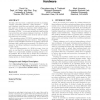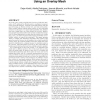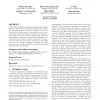123
click to vote
SOSP
2003
ACM
15 years 11 months ago
2003
ACM
We describe a new architecture for Byzantine fault tolerant state machine replication that separates agreement that orders requests from execution that processes requests. This se...
118
click to vote
SOSP
2003
ACM
15 years 11 months ago
2003
ACM
Despite decades of research in extensible operating system technology, extensions such as device drivers remain a significant cause of system failures. In Windows XP, for example,...
186
click to vote
SOSP
2003
ACM
15 years 11 months ago
2003
ACM
This paper presents a new approach called model-carrying code (MCC) for safe execution of untrusted code. At the heart of MCC is the idea that untrusted code comes equipped with a...
105
click to vote
SOSP
2003
ACM
15 years 11 months ago
2003
ACM
Recently, there has been considerable interest in providing “trusted computing platforms” using hardware — TCPA and Palladium being the most publicly visible examples. In th...
130
click to vote
SOSP
2003
ACM
15 years 11 months ago
2003
ACM
In this paper, we present STP, a system in which communicating end hosts use untrusted mobile code to remotely upgrade each other with the transport protocols that they use to com...
118
click to vote
SOSP
2003
ACM
15 years 11 months ago
2003
ACM
In recent years, overlay networks have become an effective alternative to IP multicast for efficient point to multipoint communication across the Internet. Typically, nodes self-...
119
click to vote
SOSP
2003
ACM
15 years 11 months ago
2003
ACM
The challenge for user authentication in a global file system is allowing people to grant access to specific users and groups in remote administrative domains, without assuming ...
140
click to vote
SOSP
2003
ACM
15 years 11 months ago
2003
ACM
The LOCKSS project has developed and deployed in a worldwide test a peer-to-peer system for preserving access to journals and other archival information published on the Web. It c...

